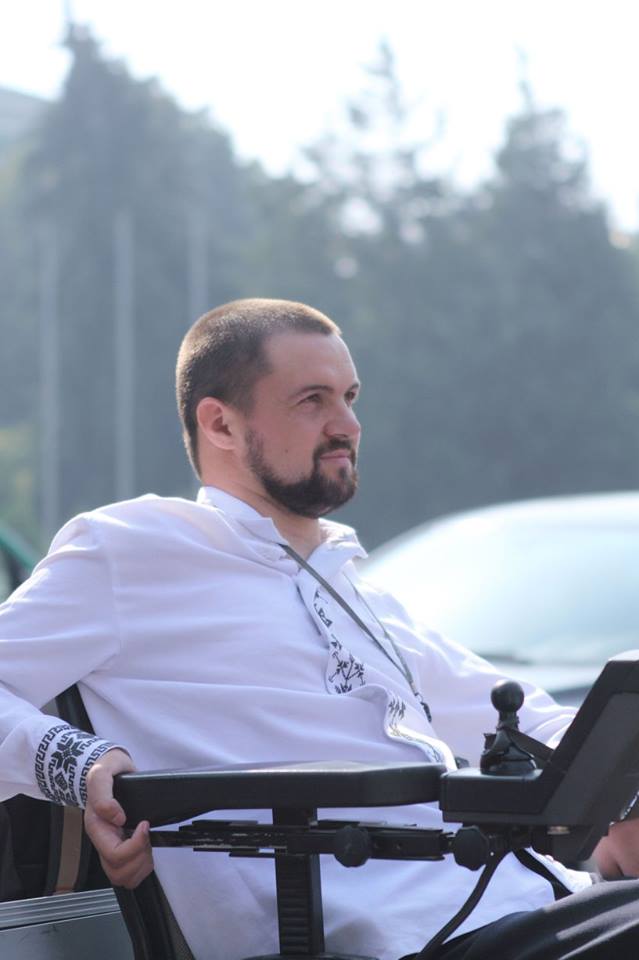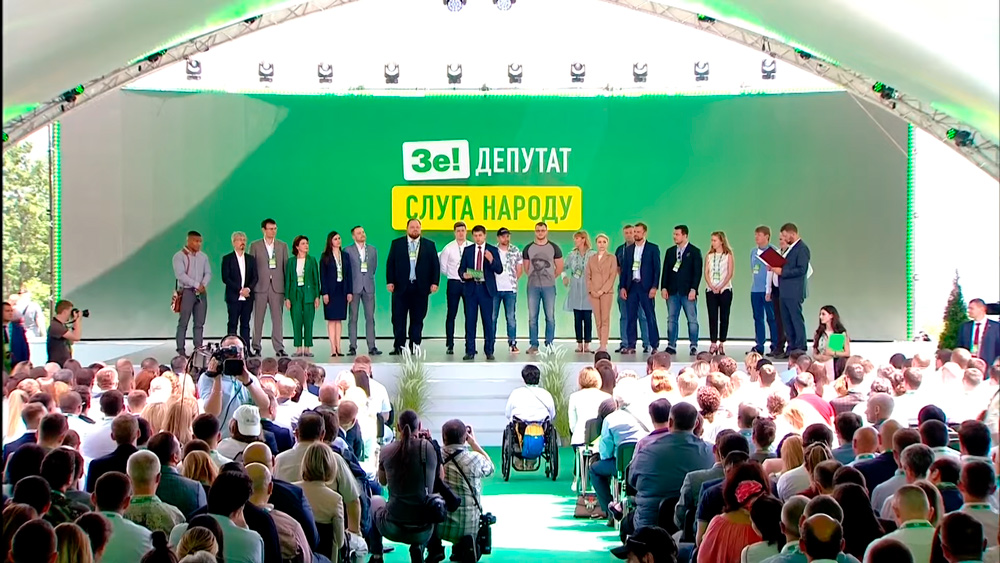A strange conversation occurred on one of the streets of the Ukrainian city of Dnipro in late November 2004. It was a windy sunny day. The last leaves, along with the first timid snowflakes, were falling down, covering the cold ground. It was the first week of the Orange Revolution-to-be in Kyiv, but the idea of a protest already spread to the whole country. My mother, who supported the revolution, was walking home, not having checked the last news yet.
A strange older woman, who couldn’t hide the excitement, started talking to her: “He won! Thank God, he won!” The unsolicited interlocutor was poorly dressed: her clothing was old and pretty worn out. “Who won?” an anxious question followed. “You ask who? Yanukovych, of course!” the older woman’s excitement started being hysterical. For my mother, it was a moment of desperation: “How can you be happy? He’s a criminal!” “So what? At least he’s ours!” was the answer.
The presidential campaign of 2004 is remembered for manipulative political electoral technologies built on separations on language, ethnicity, and other grounds. That is why, for a significant part of voters, being “ours” valued more than being law-abiding. Back in 2004, the Supreme Court nullified the results of the presidential elections because of mass electoral fraud in favor of Viktor Yanukovych. In the outcome of re-elections, Viktor Yushchenko, the leader of Orange Revolution, won. That is how in 2004, Ukrainian society proved it would not give up its right for fair elections.

What about those who once tried to violate this fundamental democratic right? Would they lose credibility? The elections of 2010 proved the opposite. The fatigue from democratically elected but politically impotent president Yushchenko resulted in what no one could imagine in 2004. This time, the Ukrainian people did elect Viktor Yanukovych for real.
Today the political arena is still dominated by old elites formed after the fall of the USSR. Even though the demand for reforms has never been higher, voters keep on supporting candidates who are least interested in changing the country. And that is no surprise, because who would ever ruin the system which has always fed them?
The question is why do people vote for them?
Eternal vicious circle of Ukrainian elections
According to the recent polls conducted by the Rating non-governmental sociological group, if the presidential elections were to be held now, more than half of the voters would support candidates representing the old elites. These candidates are not counter-systemic leaders but rather are used to functioning within the existing system that has proved to be inefficient.
Read more: Ukrainians prefer comedian to current president and other insights from pre-election polls
After the Euromaidan Revolution in 2013-2014, politicians of the new wave failed to create a new counter-systemic movement.
“I would not blame young politicians for their presence in lists of parties made from scratch [to get a specific candidate elected - Ed], with no ideological base. However, this choice deprives them of the opportunity to pave their own path of trial and error, form their own political experience and convert it in political success,” says Yevhen Mahda, political scientist and associate professor at the Kyiv Polytechnic Institute, a leading Ukrainian university. He believes that, traditionally, the new leaders who want to enter politics want to fit into the existing political system more than destroy it, regardless of the slogans voiced in public.
The only exception could be Opposition Bloc that recently faced an internal division. However, this case is again not about changes in the political vector but a confrontation of the spheres of influences within the party.
Maria Karmazina, PhD in Political Science, claims that the dominance of such “one-person parties” is the evidence of a powerful authoritarian segment in the Ukrainian political system. According to her calculations, there were 16 parties that carried the names of their leaders in Ukraine at the beginning of 2018. In her article in ZN.UA, Karmazina writes:
“naming [parties after politicians - Ed]... also means the strengthening of the process of personification of politics (which in its own way speaks of the poor quality of the latter in the Ukrainian state), the growth of populism and the degradation of interest in ideologies of both Ukrainian society and the politicians themselves.”
The absence of ideological parties and lack of societal demand for them releases a flood of populism and makes any debates traditionally held in Western democracies politically impossible. In an environment like this, even politically wise voters have nothing left to do apart from supporting the elite whose interests coincide with their own. If one was to answer the question in the headline of this article, they would naturally have to define which came first: unwise voters or irresponsible candidates? This phenomenon has created an eternal vicious circle of Ukrainian elections. But what can break the chain?
No motivation to figure out politics
In 1932, the Soviet state started physically eliminating those Ukrainians who knew how to make money, particularly, private farmers who lived in rural areas. Those events went down in history as Holodomor (an artificial famine) — a genocide, that killed from five to ten millions Ukrainians. Instead, they settled the newly ghost villages with families who were ready to work in “kolkhoz” (collective farming) and would not tolerate anything private. That is how the Soviet Union eradicated the tradition of individual entrepreneurship in Ukraine in the first half of the previous century.

The lack of business ownership among the population today might be the consequence of that dark page of history. And this might be the key factor of such a low electoral culture nowadays. A voter that has nothing to protect has much lower motivation to figure out the politics. On the contrary, a voter that has something to lose is more likely to show a genuine interest in changing the system which endangers their property and businesses. In short, a voter who runs a business is a responsible voter. After the collapse of the Soviet Union in 1991, the Ukrainian population failed to produce a critical mass of responsible voters of this kind.
People brought up by the kolkhoz system were the ones who got independence in 1991 and did not know how to deal with it. On the contrary, the politicians who gained power in Poland at that time went for rather unpopular economic reforms. The private initiative was strongly encouraged which, in turn, resulted in a GDP which grew by 2.5 times between 2000 and 1990, according to World Bank data. This was the most rapid growth among all post-communist countries.
The Baltic countries and the states of the former East Bloc outside the USSR have all gone through a process of a rapid capitalist development after the fall of the Berlin Wall. On the other hand, all other post-Soviet countries including Ukraine have been in economic and political stagnation this whole time.
Now Poland is considered to be the state with the fastest growing economy in that region. But in the early 90s, the newly emerged sovereign state of Ukraine had a far larger industry potential and much richer resources than its western neighbor.
In the political domain, the transition from socialism to capitalism in Poland was possible because of the change of the elites, while in Ukraine, elites that came to power were rather post-communist than anti-communist. The creator of “Polish Economic Miracle” Leszek Balcerowicz in his article “Understanding Post-Communist Transitions” calls that time a period of “extraordinary politics”:
“Liberation from foreign domination and domestic political liberalization produce a special state of mass psychology and corresponding political opportunities: the new political structures are fluid and the older political elite is discredited.”
Polish economist Marcin Zieliński believes that the fact that the reforms in Poland were conducted rapidly made them less painful than gradual reforms lasting several years.
“Before 1989, we had ration stamps for necessities like food. And the shortages were common. A transition from such a system had to be painful but the so-called transitional recession in Poland was exceptionally short,” says Zieliński.
Unlike Ukrainians, after the fall of communism, the population of Poland was pretty united in their support of elites offering a capitalistic development because they had what to protect.
Votes for food
It was an incredibly hot day in the city of Chernihiv in the summer of 2015. In front of the city market “Nyva,” a small tent painted in the colors of one of the political parties gathered a long line of mostly elderly people. They were waiting for the bags of grocery products to be handed out. When it became obvious that there were not enough bags, the old men and women became unusually active. People started pushing each other, prying the bags out of each other’s hands. Suddenly, when the tension spilled over the edge, the first fist hit the first face.
Anastasiya, who lives in Chernihiv, was an accidental witness of the mess. She saw an old lady who was lucky to escape the epicenter of the fight. She was holding one such bag filled with buckwheat, flour, and oil. A girl asked the lady: “So will you vote for Korban now?” An old woman rose her eyes to the girl and replied stressfully: “I have to. I put my signature. If I don’t vote, who knows, maybe they will come and murder me?”
The scene described above happened when parliamentary by-elections were held in the Chernihiv electoral district. One of the candidates, then leader of UKROP party Hennadiy Korban, used the so-called “buckwheat” technology to simply buy the necessary votes.
Where are the voters’ interests in this equation? Apparently, somewhere in the line for grocery products.
Several Ukrainian NGOs believe that introducing the proportional open-list system would solve the problem of “buying” seats in the parliament. The multi-mandate districts at the oblast level (regional division unit in Ukraine) are meant to reduce the effect of administrative resources and bribery while, at the same time, saving the regional representation. The Electoral Code with corresponding changes has already been registered at the parliament for consideration. However, at the moment, it is obviously dragging on.
But how likely are MPs to vote for the changes before the next parliamentary elections in 2019? Andriy Andrushkiv, public funds project manager at the Centre UA NGO thinks that the current members of parliament would benefit from the new Code:
“For all parliamentary factions, except for Petro Poroshenko Bloc [president’s faction], the majority system gives much worse odds. It is because majority districts candidates would run as PPB representatives and therefore would rely on the support of administrative resources and security forces in the districts. For the notional opposition [...], it would be very hard to fight with the PPB’s proteges.”
Even though the new system, if adopted, would make the parliament more representative, the electoral culture of the population would not improve per se. At least the polls suggest that voters’ preferences are still split between the old elites. What will significantly change are the rules of the game. The new Code is meant to make the fight for votes more competitive and fair, which would probably create a fruitful environment for counter-systemic leaders to emerge and gain the power.
No confrontation of views
One of the remarkable features of all post-Soviet political systems is the absence of a traditional left-right political spectrum. A rapid and unexpected shift from socialism to “wild capitalism” in 1991 did not lead to the thriving of small and medium business but to the concentration of former state-owned property in hands of several people who are now known as oligarchs.
Yevhen Mahda explains that the shortage of small and medium businesses in Ukrainian history as well as in the life of the early 90s resulted in the absence of social demand for transformation.
“Politicians who came to power in 1991 were able to convince the population that preserving relative stability is better than transformation. They used the turbulence in Russia and the Caucasus in their own interests, offering a freeze of activity instead of rational reforms, the price of which would be much lower than today,” says the scholar.
Today, within the existing system, even new leaders don’t have a traditional ideological base which they could offer to voters. And it is logical given that none of them go against the system/ Ukrainian prominent journalist Sonya Koshkina accuses these so-called “fresh faces” of a lack of confrontation of views:
“... Ukrainian society [...] did not give a way to a new national leader [...] which could fully qualify for the main position in the country. The new leaders should compete by offering meanings, not forms — ‘the of the oligarchs,’ ‘the bid of the West,’ ‘the bid of clowns.’”
What inspires optimism is the population’s falling trust in the old elites. According to anti-corruption activist Vitaliy Shabunin, the number of people who don’t trust any of the political parties has grown by 15%. Who knows, maybe with the introduction of the new Code, the counter-systemic elites will gain the power and finally conduct the necessary economic reforms? Of course, the emergence of a new kind of responsible voters will remain a matter of a longer time. But what if it will be the first step to break the eternal vicious circle of Ukrainian politics?

Read also:
- With elections approaching, electoral reform in Ukraine still a distant hope
- Phony "elections" in Russia's phony "republics" in Ukraine: a legitimization of the occupation
- Elections 2019: beware of Ukrainian media manipulating polls and ratings
- Electing bad leaders in Ukraine: how to break the vicious cycle #UAreforms





